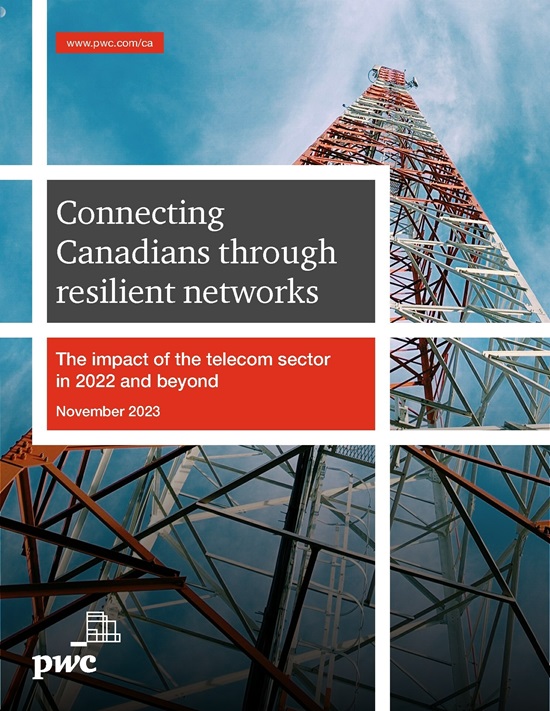
TORONTO – Canada’s telecommunications sector directly contributed up to $76.7 billion to the national GDP and supported 724,000 Canadian jobs in 2022, according to a new PricewaterhouseCoopers (PwC) report commissioned by the Canadian Telecommunications Association (CTA).
The same report estimates that the Canadian telecom sector’s delivery of enhanced connectivity, including 5G, has the potential to contribute an additional $112 billion to Canada’s overall GDP by 2035.
The report, titled Connecting Canadians through resilient networks: The impact of the telecom sector in 2022 and beyond, shows how Canada’s telecom sector invests billions of dollars each year to meet customer expectations for network quality, coverage and resiliency. According to the report, the Canadian telecom sector continues to outpace its international peers when it comes to investing in network infrastructure.
“The report finds that Canada’s six largest telecoms invested $13.3 billion in capital expenditures in 2022 to continue expanding, enhancing, and strengthening their world-class wireless and broadband networks,” reads a CTA press release announcing the report’s publication. “Over the past five years, the Canadian telecom sector has invested an annual average of $12.1 billion in capital on network infrastructure. This represents approximately 18.6% of average revenues, which is higher than the 14.2% average across the peer telecoms in the U.S.A., Japan, Australia, and Europe.”
As the telecom sector continues to make significant capital investments in their networks, the PwC report notes that between September 2022 and September 2023 cellular and internet access service prices declined by 17.2 per cent and 7.8 per cent, respectively, while over the same period, the all-items Consumer Price Index (CPI) increased by 3.8 per cent.
“Canada’s telecom sector is making important contributions to the prosperity of Canada through contributions to GDP, jobs and investments, while vigorous competition among our national and regional service providers has resulted in a steady decline in cellular and internet access prices,” Robert Ghiz, president and CEO of the CTA, said in the organization’s press release.
“But our work is not done. More investment is required to expand coverage and fund network resiliency. To achieve the required levels of investment, we need government policies that recognize the importance of investment and that maintain a stable regulatory environment that encourages private sector investment in network infrastructure,” Ghiz added.
Speaking during a Bell third-quarter earnings conference call last week, Bell CEO Mirko Bibic said regulatory uncertainty related to impending fibre and wholesale access decisions at the CRTC caused the company to slow down its push to build out more fibre infrastructure than its target plan for 2023.
On his own company’s third-quarter earnings call last week, Telus CEO Darren Entwistle said he anticipates a more moderate regulatory environment in the future.
Front cover image of PwC’s report.


